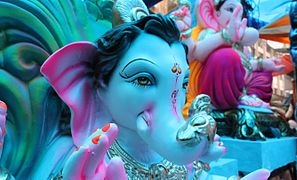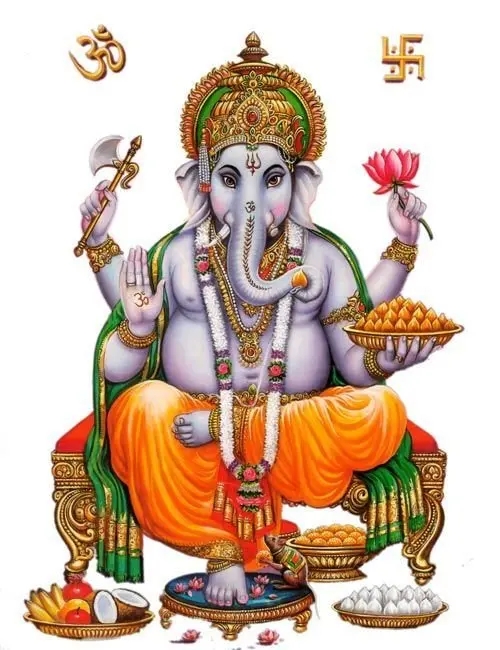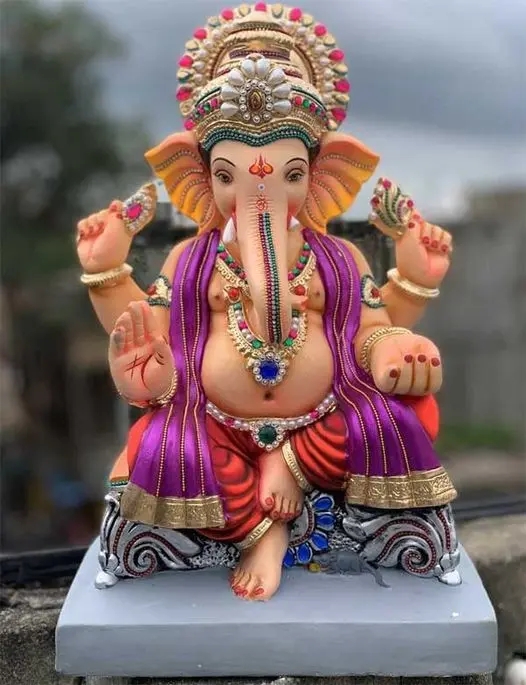
Ganesha Chaturthi is celebrated as the birth anniversary of Lord Ganesha. Although there are contradictory views on the birth anniversary of Lord Ganesha, most people celebrate it on Shukla Chaturthi during Bhadrapada lunar month and the day is popularly known as Ganesha Chaturthi.
On Vinayaka Chaturthi day, students place books in front of the Ganesa idol and offer worship. They pray to the deity to illumine their minds. Hence Ganesa is known as “Buddhi Pradayaka“, one who grants intelligence.
All the sacred festivals celebrated by devotees are full of significance spiritually and socially. Every festival is regarded as a holy event surcharged with divinity. On such a holy day, each house is cleaned up, everybody takes a sacred bath to purify the body, special pujas are performed, coconut is offered to the deity and prayers are offered during the day.

There is no master above Vinayaka
The Vinayaka-principle, however, has only one meaning, which is relevant to everyone irrespective of whether he is a believer or a non-believer. “Vinayaka” means that He is totally master of Himself. He has no master above Him, He does not depend’ on anyone. He is also called Ganapathi. This term means He is the lord of the ganas – a class of divine entities. This term also means that He is the master of the intellect and discriminating power in man. He possesses great intelligence and knowledge. Such knowledge issues from a pure and sacred mind. This knowledge leads to Vijnana (wisdom). Because He is the master of Buddhi (intelligence) and Siddhi (wisdom or realisation), He is described as the Lord of Buddhi and Siddhi. Buddhi and Siddhi are referred to as the consorts of Vinayaka.
The mouse is the vehicle of Vinayaka. What is the inner significance of the mouse? The mouse is considered as the embodiment of the sense of smell. The mouse is a symbol of the attachment to worldly vasanas (tendencies). It is well known that if you want to catch a mouse you place a strong-smelling edible inside the mouse-trap. The mouse also symbolises the darkness of night. The mouse can see well in the dark. As Vinayaka’s vehicle, the mouse signifies an object that leads man from darkness to light. The Vinayaka-principle, thus, means that which removes all the bad qualities, bad practices and bad thoughts in men and inculcates good qualities, good conduct and good thoughts.
Another name for Vinayaka is “Vighneswara.” Easwara is one who is endowed with every conceivable form of wealth: riches, knowledge, health, bliss, beauty, etc. Vighneswara is the promoter of all these forms of wealth and removes all obstacles to their enjoyment. He confers all these forms of wealth on those who worship him. Vinayaka is described as “Prathama Vandana” (the first deity who should be worshipped). As everyone in the world desires wealth and prosperity, everyone offers the first place for worship to Vigneswara.
It is only when the inner meanings of various aspects relating to the Divine are understood that worship can be offered to the Divine meaningfully. Unfortunately, as only the superficial and worldly meanings of the scriptural texts are expounded these days, men’s devotion is growing weaker continually. It is essential for everyone to understand the inner meaning of the Vedantic texts, (SSSpk Vol 24)
Vakratunda Mahakaya Sloka
Vakratunda Mahakaya Suryakoti Samaprabha
Nirvighnam Kuru Me Deva Sarva-Kaaryeshu Sarvada
O Lord Ganesha of the curved trunk and massive body, the one whose splendor is equal to millions of Suns, please bless me to that I do not face any obstacles in my endeavors.
He is a deity of infinite potency.
Vigneswara is described as one wearing a white cloth. His body is ash-grey. He is depicted as having four arms and a cheerful countenance. The white cloth signifies purity of mind and heart. By worshipping Him, you must endeavour to achieve similar purity. Vinayaka always appears serene and calm. By his grace, the devotee must seek to achieve similar equanimity, whatever may be the ups and downs in life. (SSSpk Vol 22)

Vigneswara Ashtothra Shatha Namavali
“Dhyanam
SarvaVignaharam Devam SarvaKaryaphalapradham
Sarvasiddhi pradhataram Vandeham Gaananayakam“
I salute the leader of all Ganas,
Who removes all obstacles,
Who fulfills all actions,
And who blesses us with siddhi of wisdom.
Om Vinayakaya Namaha – Blessed Lord of all
Om Vighnarajaya Namaha -The king of obstacles
Om Gauriputraya Namaha -The son of Goddess Gauri
Om Ganesvaraya Namaha -The blesses leader of all Ganas
Om Skandagrajaya Namaha -The elder brother of Skanda(Subrahmanya)
Om Avyayaya Namaha -He who is stable and does not change
Om Putaya Namaha -He who shines
Om Dakshaya Namaha -He who is an expert
Om Adhyakshaya Namaha -He who presides
Om Dvijapriyaya Namaha -He who likes the twice born
Om Agnigarbhachide Namaha – He who has fire in his stomach
Om Indrasripradaya Namaha -He who granted wealth to Indra
Om Vanipradaya Namaha -He who grants voice
Om Avyayaya Namaha -He who never alters
Om Sarvasiddhipradaya Namaha – He who grants all occult powers
Om Sarvajnanayaya Namaha -He who knows everything
Om Sarvaripriyaya Namaha -He who is liked by every one
Om Sarvatmakaya Namaha-He who is the soul of everyone
Om Srushtikatre Namaha -He who creates
Om Devaya Namaha -He who is God
Om Anekarchitaya Namaha-He who is worshipped by dseveral
Om Sivaya Namaha -He who is Lord Shiva himself
Om Suddhaya Namaha -He who is cleanliness
Om Buddhipriyaya Namaha-He who likes knowledge
Om Santaya Namaha -He who is a saint
Om Brahmacharine Naamaha -He who is a Brahma chari
Om Gajananaya Namaha -He who killed Gaja mukhasura
Om Dvaimatreyaya Namaha -He who is double
Om Munistutyaya Namaha -He who is worshipped by sages
Om Bhaktavighnavinasanaya Namaha -He who removes obstacles in pathof devotion
Om Ekadantaya Namaha -He who has only one tusk
Om Chaturbahave Namaha -He who has four different aspects
Om Chaturaya Namaha -He who is clever
Om Saktisamyutaya Namaha -He who is with power
Om Lambodaraya Namaha -He who has a broad paunch
Om Surpakarnaya Namaha-He who has winnow like ears
Om Haraye Namaha -He who is Hara (shiva)
Om Brahmaviduttamaya Namaha – He who an expert in knowledge of Brahma
Om Kalaya Namaha -He who is a crescent (He who is artful)
Om Grahapataye Namaha -He who is chief of planets (House)
Om Kamine Namaha -He who desires
Om Somasuryagnilochanaya Namaha -He who has Sun ,moon and fire as eyes
Om Pasankusadharaya Namaha -He who holds the rope and the goad.
Om Chandaya Namaha -He who is fierce
Om Gunatitaya Namaha -He who is as bright as Sun
Om Niranjanaya Namaha -He who is spotless and pure
Om Akalmashaya Namaha -He who does not have any stain
Om Svayamsiddhaya Namaha-He who has become sidha himself
Om Siddharchitapadambujaya Namaha -He whose feet is worshipped by saints
Om Bijapuraphalasaktaya Namaha -He who likes to get results of Bhija
Om Varadaya Namaha -He who gives boons (He who blesses)
Om Sasvataya Namaha -He who is perennial
Om Krutine Namaha -He who performs
Om Dvijapriyaya Namaha -He who likes the twice born
Om Vitabhayaya Namaha -He who is never afraid
Om Gadine Namaha -He who is our ultimate goal
Om Chakrine Namaha -He who is Lord Vishnu
Om Ikshuchapadhrite Namaha -He holds the bow of sugarcane
Om Sridaya Namaha -He who blesses with wealth
Om Ajaya Namaha -He who is not born
Om Utpalakaraya Namaha -He holds lotus in his hand
Om Sripataye Namaha -He who is the lord of wealth
Om Stutiharshitaya Namaha -He who becomes happy because of prayer
Om Kuladribhettre Namaha -He who broke the mountain
Om Jatilaya Namaha -He who is an ascetic
Om Kalikalmashanasanaya Namaha -He who destroys the ills of Kali age
Om Chandrachudamanaye Namaha-He who wears the crescent
Om Kantaya Namaha -He who is very pleasing
Om Papaharine Namaha -He who cures sins
Om Samahitaya Namaha -He who has an affable personality
Om Asritaya Namaha -He who protects
Om Srikaraya Namaha -He who does good deeds
Om Saumyaya Namaha -He who is very peaceful
Om Bhaktavanchitadayakaya Namaha-He who fulfills the desire of devotees
Om Santaya Namaha -He who is peaceful
Om Kaivalyasukhadaya Namaha -He who grants the pleasure of salvation
Om Sachidanandavigrahaya Namaha -He who is the personification of divine joy
Om Jnanine Namaha-He who is wise
Om Dayayutaya Namaha-He who is merciful
Om Dantaya Namaha -He who has a tusk
Om Brahmadveshavivarjitaya Namaha – He who abandoned enmity to Lord Brahma
Om Pramatta daityabhayadaya Namaha-He who is fearful to Asuras
Om Srikanthaya Namaha -He who is the glorious light
Om Vibhudesvaraya Namaha -He who is the God of all divine beings
Om Ramarchitaya Namaha -He who is in the mind of Rama
Om Vidhaye Namaha -He who is very learned
Om Nagarajayajnopavitavate Namaha-He who wears snake as sacred thread
Om Sthulakanthaya Namaha -He who has very gross body
Om Svayamkartre Namaha -He who is made by himself
Om Samaghoshapriyaya Namaha -He who likes the singing of Sama Veda
Om Parasmai Namaha-He who is beyond everything
Om Sthulatundaya Namaha-He who has a big tusk
Om Agranye Namaha -He who is the first
Om Dhiraya Namaha -He who is brave
Om Vagisaya Namaha -He who is the God of words
Om Siddhidayakaya Namaha -He who makes things happen and removes obstacles
Om Durvabilvapriyaya Namaha -He who likes Bilwa leaves and Durva grass
Om Avyaktamurtaye Namaha -He who does not have a clear form
Om Adbhutamurtimate Namaha – He who has a wonderful form
Om Sailendratanujotsanga Khelanotsukamanasaya Namaha-He who gets pleased by playing with the lord of Mountains
Om Svalavanyasudhasarajita Manmathavigrahaya Namaha-He who has a pretty form like nectar and has a form like God of love
Om Samastajagadadharayai Namaha -He who carries all the universe
Om Mayine Namaha – He who has an illusory form
Om Mushikavahanaya Namaha -He who rides on the mouse
Om Hrushtaya Namaha –He who is pleased
Om Tushtaya Namaha -He who is always satisfied
Om Prasannatmane Namaha-He who has a very pleasant attitude
Om Sarvassiddhipradayakaya Namaha -He who grants all powers
“Ithi Sri Vigneshwara Astothara Satharamavali hi”
Thus ends the 108 holy names of Vigneswara

![]()

